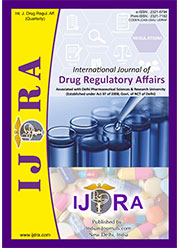PROBIOTIC FUNCTIONAL FOOD VS DRUGS: IMPACT OF INDIAN REGULATORY STATUS ON DESIGN OF QUALITY CONTROL GUIDLINES FOR PROBIOTICS
Abstract
Probiotic now a day's generally utilized all around the globe because of headway as a part of the relationship in the middle of nourishment and wellbeing other than their promising helpful advantages and irrelevant reactions. Indian probiotic industry is accomplishing its pace at relentless rate with open doors for fast development in not so distant future. Indian probiotic business sector is esteemed at US $310 million in 2011, is required to witness US $522.8 million by 2018. Presentation of a scope of pharmaceutical probiotic definitions in the business sector further expanded the turnover of probiotic industry. The eventual fate of probiotic sustenance's is notwithstanding encouraging, as current buyers are concerned to keep up their own wellbeing, and expect the nourishment that they eat to be solid and equipped for counteracting ailment. this is the time when Indian regulatory bodies/ authorities should prepare a guideline to evaluate efficacy claims rigorously, and by consumers interested in potential therapeutic and preventive health benefits. The Indian marketplace is a mixed bag of products, some well-defined and properly evaluated in controlled clinical studies and others with unsubstantiated claims of efficacy. Validation of probiotic contents in commercial products is needed to ensure consumer confidence. Probiotics must be identified to the level of strain, must be characterized for the specific health target, and must be formulated into products using strains and doses shown to be efficacious. Several characteristics commonly presumed to be essential to Probiotics, such as human origin and the ability to improve the balance of the intestinal microbiota, are discussed.
Downloads
References
http://www.who.int/foodsafety/publications/fs_management/en/Probiotics.pdf
2. Food and Agriculture Organization of the United Nations (FAO) [Internet]. FAO, food safety and quality; 2001 [cited 2015 Jun 05]. Available from: http://www.fao.org/food/food-safety-quality/a-z-index/Probiotics/en/
3. Central Drugs Standard Control Organization (CDSCO) [Internet]. The Drugs and Cosmetics (Amendment) Act, 1995 (71 of 1995); [cited 2015 Jun 05]. Available from:
http://www.cdsco.nic.in/writereaddata/Drugs&CosmeticAct.pdf
4. FAO Food and Agriculture Organization of the United Nations [Internet]. Rome: Food and nutrition paper 85; 2006 [cited 2015 Jun 05]. Available from:
ftp://ftp.fao.org/docrep/fao/009/a0512e/a0512e00.pdf
5. FAO/WHO. Report of a joint FAO/WHO expert consultation on guidelines for the evaluation of Probiotics in food [Internet].London, Ontario, Canada: FAO/WHO:2002 May 1 [cited 2015 Jun 05]. Available from:
ftp://ftp.fao.org/es/esn/food/wgreport2.pdf
6. Morelli L, Capurso L. FAO/WHO Guidelines on Probiotics: 10 Years Later. Journal of clinical gastroenterology [Internet]. 2012 Oct [cited 2015 Jun 05]; 46 (suppl 1):p s1-s2. Available from:
http://journals.lww.com/jcge/Citation/2012/10001/FAO_WHO_Guidelines_on_Probiotics__10_Years_Later.2.aspx
7. Narayanan R. Current legislations on Probiotic products. Journal of agriculture science [Internet]. 2013 Apr [updated 2015 Jun; cited 2015 Jun 06]; 1(2):18-24. Available from:
http://www.accessinterjournals.org/jas/PDF/2013/APRIL/NARAYANAN.pdf
8. Arora M, Baldi A. Publication of India association of medical microbiologist. Indian journal of medical microbiology [Internet]. 2015 Feb [cited 2015 Jun 06]; 33(Supplement 1): S2-10. Available from:
http://www.researchgate.net/profile/Dr_Ashish_Baldi/publication/272078022_Regulatory_categories_of_Probiotics_across_the_globe_A_review_representing_existing_and_recommended_categorization/links/54edc39a0cf25da9f7f22b6d.pdf
9. Science daily. FDA must find regulatory balance for Probiotics [Internet]. Science daily; 2013 Oct 13 [updated 2015 Jun; cited 2015 Jun 07]. Available from:
http://www.sciencedaily.com/releases/2013/10/131017144630.htm

This work is licensed under a Creative Commons Attribution-NonCommercial 4.0 International License.
The International Journal of Drug Regulatory affairs require a formal written transfer of copyright from the author(s) for each article published. We therefore ask you to complete and return this form, retaining a copy for your records. Your cooperation is essential and appreciated. Any delay will result in a delay in publication.
I/we have read and agree with the terms and conditions stated Page 2 of this agreement and I/we hereby confirm the transfer of all copyrights in and relating to the above-named manuscript, in all forms and media, now or hereafter known, to the International Journal of Drug Regulatory affairs, effective from the date stated below. I/we acknowledge that the IJDRA is relying on this agreement in publishing the above-named manuscript. However, this agreement will be null and void if the manuscript is not published in the IJDRA.
Download link for COPYRIGHT FORM







